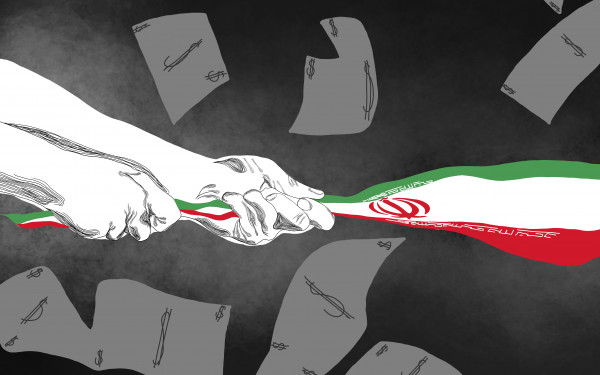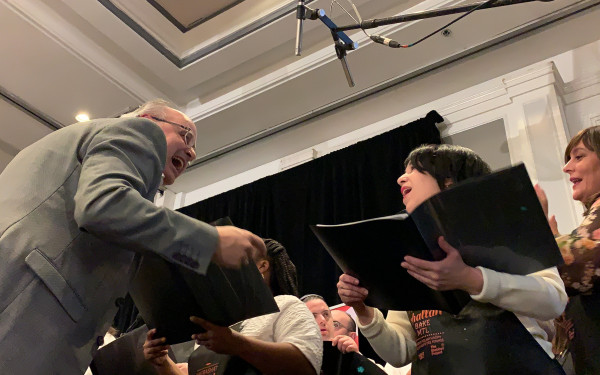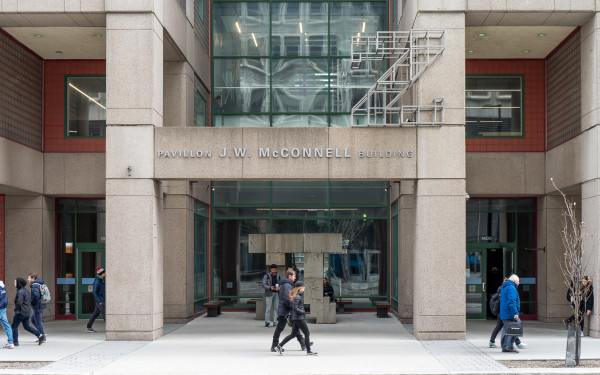Education Under Fire in Iran
Bahá’í Religious Group Brings Human Rights Issue to ConU
Systematic discrimination, violence and the denial of basic civil rights in Iran is actively been countered by education, and the discussion came to Concordia University on Jan. 19.
Education Under Fire, a human rights campaign that has produced a documentary film of the same name, aims to bring awareness to the denial of the Bahá’í population’s access to opportunities for learning in their own country.
An unrecognized religious minority with an estimated 300,000 members, the Bahá’í have been systematically persecuted and subjected to arrests, torture, and false imprisonment, according to Amnesty International.
“The way that [Iran] operates now, […] rights and Bahá’í freedoms are generally repressed across the board,” said Donna Hakimian, national campaign consultant for EUF. “One of the groups that really faces this is the students.”
Calling the lack of admission to hire education “a very dire and distressing situation,” Hakimian explained that the Bahá’í traditionally place a high social and religious value on education.
Comprised of many members from a wide variety of backgrounds worldwide, EUF was formed with the main goal of exposing the oppression of the Bahá’í people in Iran. The group says the persecution of the Bahá’í stem from their teachings, which are inconsistent with traditional Islamic beliefs.
“It’s a very dire situation because the Bahá’í value education so much. So when the entire Bahá’í population cannot attend university, it is very distressing,” said Hakimian.
Constant threat of government retribution has not hindered their desire for education, however, as an underground teaching network to educate the Bahá’í youth in Iran has been in operation since 1987, currently educating around 50,000 students.
This initiative, known as the Bahá’í Institute for Higher Education, is the subject of the documentary.
Raising awareness of this issue in Canada and screening the film is something that Yovania Veeren, project coordinator of the Bahá’í Community in Canada, thinks is essential to helping put an end to the injustice.
The documentary exposes how Bahá’í adherents have dealt with their oppression in a manner “very different from the ways one would usually think that one would respond to persecution,” said Veeren. “There was no violence whatsoever—it is very peaceful.”
But recently, professors have come under attack by government forces raiding the houses where classes were taking place and imprisoning educators, said Veeren.
In 2006, 54 young people were arrested by Iranian officials, allegedly during a community service teaching project, and were eventually sentenced to four years in prison for propaganda against the regime. In May 2011, 30 homes were raided.
While doing research in Iran, Montreal filmmaker Nika Khanjani came into contact with the BIHE and remained with them for two years as a volunteer educator.
“The university was the example […] of this response to systematic persecution in a way that was tremendously creative, absolutely collaborative [and] completely volunteer-run—and it was functioning,” said Khanjani. “That was the miracle that I was witnessing, that this university was actually working.”
The Concordia Association for Bahá’í Studies hosted this weekend’s panel discussion, and Concordia history professor Dr. Frank Chalk—who is also director of the Montreal Institute for Genocide and Human Rights Violations—compared the plight of the Bahá’í people to other atrocities brought on by hate propaganda, such as the Holocaust and the Rwandan genocide.
“We have documentary evidence going back to 2005 that the military and intelligence agencies of the government of Iran are insidiously working to identify all the members of the Bahá’í faith in the country,” said Chalk.
The Bahá’í in Iran were murdered in the hundreds through 1979 and 1981, Clark continued, explaining that a campaign of targeted killing and assassinations actively sought to eliminate the entire leadership of the Bahá’í faith.
Education Under Fire has been screened at many universities, including Harvard—which is now among 50 other universities in the United States recognizing degrees from the BIHE.
“According to Elise Auerbach from Amnesty International,” said Hikimian, “the Iranian Government is very sensitive to their public image. So if professors are now talking about [what is happening], if it’s included in syllabuses, if people are writing letters to the Iranian Government, it does elicit change.”
Visit the EUF website, educationunderfire.com for more information.



_600_375_90_s_c1.jpg)

